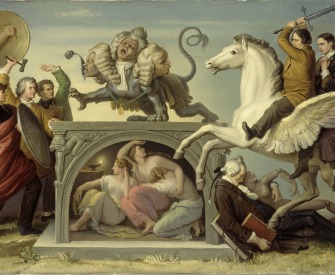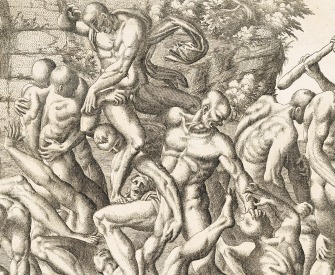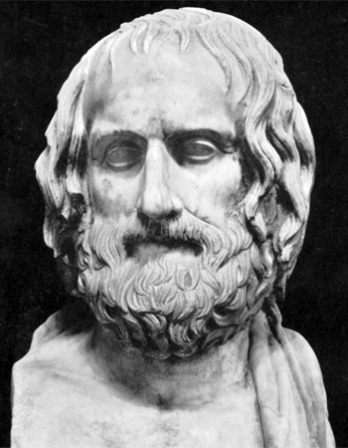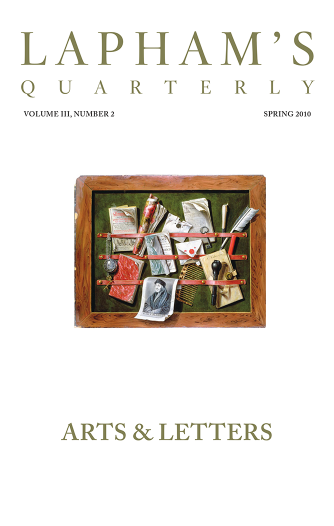When he reached his rooms that afternoon, Senator Ratcliffe found there, as he expected, a choice company of friends and admirers, who had beguiled their leisure hours since noon by cursing him in every variety of profane language that experience could suggest and impatience stimulate.
On his part, had he consulted his own feelings only, he would then and there have turned them out and locked the doors behind them. So far as silent maledictions were concerned, no profanity of theirs could hold its own against the intensity and deliberation with which, as he found himself approaching his own door, he expressed between his teeth his views in respect to their eternal interests. Nothing could be less suited to his present humor than the society which awaited him in his rooms. He groaned in spirit as he sat down at his writing table and looked about him. Dozens of office seekers were besieging the house, men whose patriotic services in the last election called loudly for recognition from a grateful country. They brought their applications to the senator with an entreaty that he would endorse and take charge of them. Several members and senators, who felt that Ratcliffe had no reason for existence except to fight their battle for patronage, were lounging about his room, reading newspapers, or beguiling their time with tobacco in various forms, at long intervals making dull remarks, as though they were more weary than their constituents of the atmosphere that surrounds the grandest government the sun ever shone upon. Several newspaper correspondents, eager to barter their news for Ratcliffe’s hints or suggestions, appeared from time to time on the scene and, dropping into a chair by Ratcliffe’s desk, whispered with him in mysterious tones.
Thus the senator worked on, hour after hour, mechanically doing what was required of him, signing papers without reading them, answering remarks without hearing them, hardly looking up from his desk, and appearing immersed in labor. This was his protection against curiosity and garrulity. The pretense of work was the curtain he drew between himself and the world. Behind this curtain his mental operations went on, undisturbed by what was about him, while he heard all that was said, and said little or nothing himself. His followers respected this privacy and left him alone. He was their prophet and had a right to seclusion. He was their chieftain, and while he sat in his monosyllabic solitude, his ragged tail reclined in various attitudes about him, and occasionally one man spoke, or another swore. Newspapers and tobacco were their resource in periods of absolute silence.
A shade of depression rested on the faces and the voices of Clan Ratcliffe that evening, as is not unusual with forces on the eve of battle. Their remarks came at longer intervals and were more pointless and random than usual. There was a want of elasticity in their bearing and tone, partly coming from sympathy with the evident depression of their chief, partly from the portents of the time. The president was to arrive within forty-eight hours, and as yet there was no sign that he properly appreciated their services; there were signs only too unmistakable that he was painfully misled and deluded, that his countenance was turned wholly in another direction, and that all their sacrifices were counted as worthless. There was reason to believe that he came with a deliberate purpose of making war upon Ratcliffe and breaking him down, of refusing to bestow patronage on them, and of bestowing it wherever it would injure them most deeply. At the thought that their honestly earned harvest of foreign missions and consulates, department bureaus, customhouse and revenue offices, postmasterships, Indian agencies, and army and navy contracts might now be wrung from their grasp by the selfish greed of a mere accidental intruder—a man whom nobody wanted and everyone ridiculed—their natures rebelled, and they felt that such things must not be, that there could be no more hope for democratic government if such things were possible. At this point they invariably became excited, lost their equanimity, and swore. Then they fell back on their faith in Ratcliffe; if any man could pull them through, he could; after all, the president must first reckon with him, and he was an uncommon tough customer to tackle.
Perhaps, however, even their faith in Ratcliffe might have been shaken, could they at that moment have looked into his mind and understood what was passing there. He was now filled with disgust and cynical contempt for every form of politics. During long years he had done his best for his party; he had sold himself to the devil, coined his heart’s blood, toiled with a dogged persistence that no day laborer ever conceived; and all for what? To be rejected as its candidate; to be put under the harrow of a small Indiana farmer who made no secret of the intention to “corral” him, and as he elegantly expressed it, to “take his hide and tallow.” Ratcliffe had no great fear of losing his hide, but he felt aggrieved that he should be called upon to defend it, and that this should be the result of twenty years’ devotion. Like most men in the same place, he did not stop to cast up both columns of his account with the party, nor to ask himself the question that lay at the heart of his grievance: How far had he served his party and how far himself? He was in no humor for self-analysis. But as for political life, the events of the last six months were calculated to make any man doubt its value. He was quite out of sympathy with it. He hated the sight of his tobacco-chewing, newspaper-reading satellites, with their hats tipped at every angle except the right one, and their feet everywhere except on the floor. Their conversation bored him and their presence was a nuisance.
Ratcliffe was a great statesman. The smoothness of his manipulation was marvelous. No other man in politics, indeed no other man who had ever been in politics in this country, could—his admirers said—have brought together so many hostile interests and made so fantastic a combination. Some men went so far as to maintain that he would “rope in the president himself before the old man had time to swap knives with him.” The beauty of his work consisted in the skill with which he evaded questions of principle. As he wisely said, the issue now involved was not one of principle but of power. The fate of that noble party to which they all belonged, and which had a record that could never be forgotten, depended on their letting principle alone. Their principle must be the want of principles. There were indeed individuals who said in reply that Ratcliffe had made promises which never could be carried out, and there were almost superhuman elements of discord in the combination, but as Ratcliffe shrewdly rejoined, he only wanted it to last a week, and he guessed his promises would hold it up for that time.
From Democracy. The great-grandson and grandson, respectively, of the second and sixth U.S. presidents, Adams was a historian, journalist, and man of letters who moved in prominent New England and Washington social circles. He published this work, subtitled “An American Novel,” anonymously, perhaps to hide the growing cynicism and disdain he felt for the country’s political class. His authorship only came to light after his death in 1918, one year before he was awarded a posthumous Pulitzer Prize for his autobiography, The Education of Henry Adams.
Back to Issue





